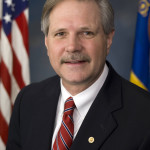
(NDAgConnection.com) – Senator John Hoeven, recently hosted U.S. Forest Service Chief Randy Moore in North Dakota. The focus of their meetings was to enhance access to the national grasslands for diverse activities such as grazing, energy production, and tourism. This initiative is part of Hoeven’s ongoing efforts to support the state’s important industries.
A significant part of their discussion was the Travel Management Plan (TMP) by the USFS, which aims to catalog and provide public access to roads in the Little Missouri National Grasslands. The plan is set to begin its scoping process in January 2025, ensuring that all local stakeholders, including grazers and energy producers, have their interests represented.
Hoeven has been instrumental in addressing environmental and operational challenges on these lands. He successfully collaborated with USFS Deputy Chief Chris French last year to secure $4.5 million for combating noxious weeds in the Dakota Prairie Grasslands. These efforts are crucial for maintaining healthy grasslands and supporting the agriculture and energy sectors.
The Senator also emphasized the importance of converting orphaned oil wells into freshwater wells, a move that benefits livestock during droughts and aids in fire suppression.
“North Dakota is home to more than 1.2 million acres of national grasslands,” Hoeven stated, highlighting the complex ownership and regulatory challenges. He added, “Congress has mandated that federal lands be made available for multiple uses, but in the past, we’ve seen efforts to undermine the law and restrict access.”
Hoeven is advocating for a strong farm bill to support daily farming and ranching operations. His priorities include modernizing Farm Service Agency loan limits, strengthening livestock disaster programs, and improving market transparency. These measures aim to make agricultural programs more voluntary and farmer-friendly, reducing the regulatory burden.
Through these initiatives, Senator Hoeven continues to champion the needs of North Dakota’s farmers and energy producers, ensuring they have the tools and access needed to grow.
